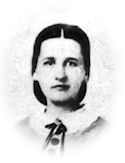December 4th, 1862.—Now, that the bullet has been extracted, Brother Amos is improving rapidly and he tells us many interesting things as he lies there so helpless. Last night his thoughts turned to the battle of Seven Pines; it seems that he, with a party of his company, was detailed to help to bury the dead. Some of those he found were acquaintances and two were kinsmen but the deepest interest with him centered in two young strangers, who were found clasped in each others arms. One wore the blue uniform and the other was a lieutenant in a Maryland regiment and wore the gray. They were of the same size and figure and when he looked into the poor dead faces they were exactly alike. He was so sure they must be brothers that he examined the papers in the pockets of each, and, sure enough, they must have been brothers—maybe twin brothers, as the last name was the same. In each boy’s pocket were letters from the same place in Maryland and though these letters were simply signed “Mother,” the writing was identical. They looked to be boys of twenty or perhaps less. He buried them still in that close embrace. The pine tree, beneath which they were found was carefully marked; some cannon balls were picked up and piled above them and when brother Amos returned to camp he wrote to that mother and told her all this.
I wonder why they were on opposite sides in this gigantic struggle. Will the poor, bereaved mother send and take them home or will they sleep on, under the Virginia pines? Brother Amos says he sent the contents of each boy’s pockets to the mother in Maryland. How her poor heart must ache.
Now brother Amos is able to sit up and can even stand with his crutches and we are going to a house party, at the home of his oldest brother. Mr. John Whitehead is too old for army duty and he is also too fat for a soldier. Three of his four brothers have been wounded and are convalescent and he is having a family reunion. Sister Mart and I are going, too, for the Whitehead girls are dear friends of ours. Mother has made me some pretty clothes and it would make a funny picture if I could portray the great amount of turning and fixing she had to do to get me “something out of nothing,” she says. We Southerners are copying Burns’ heroine, who “Gars auld cloes look amaist as weel’s the new.” I really believe I forgot my Scotch just there and should have written “noo.” I wish I could take my black mammy with me, it is bad getting on without her but she always has a baby.



